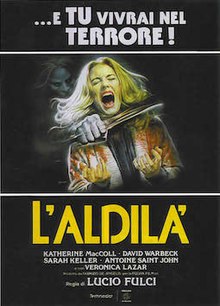| The Beyond | |
|---|---|
 Italian theatrical release poster by Enzo Sciotti | |
| Italian | …E tu vivrai nel terrore! L'aldilà |
| Literally | And you will live in terror! The afterlife |
| Directed by | Lucio Fulci |
| Screenplay by |
|
| Story by | Dardano Sacchetti[1] |
| Produced by | Fabrizio De Angelis[1] |
| Starring | |
| Cinematography | Sergio Salvati[1] |
| Edited by | Vincenzo Tomassi[1] |
| Music by | Fabio Frizzi[1] |
Production company | Fulvia Film[1] |
| Distributed by | Medusa Distribuzione[2] |
Release date |
|
Running time | 87 minutes[3] |
| Country | Italy[4] |
| Language | English |
| Budget | $400,000[5] |
| Box office | £747.6 million ($416,652.16) |
The Beyond (Italian: …E tu vivrai nel terrore! L'aldilà, lit. "… And you will live in terror! The afterlife") is a 1981 English-language Italian Southern Gothic[6][7] supernatural horror film directed by Lucio Fulci. It is based on an original story created by Dardano Sacchetti, starring Catriona MacColl and David Warbeck. Its plot follows a woman who inherits a hotel in rural Louisiana that was once the site of a horrific murder, and which may be a gateway to hell. It is the second film in Fulci's Gates of Hell trilogy after City of the Living Dead (1980), and was followed by The House by the Cemetery (1981).[8]
Filmed on location in and around New Orleans in late 1980 with assistance from the Louisiana Film Commission, additional photography took place at De Paolis Studios in Rome. Released theatrically in Italy in the spring of 1981, The Beyond did not see a North American release until late 1983 through Aquarius Releasing, which released an edited version of the film titled 7 Doors of Death; this version featured an entirely different musical score and ran several minutes shorter than Fulci's original cut, and was branded a "video nasty" immediately upon its release in the United Kingdom. The original version of the film saw its first United States release in September 1998 through a distribution partnership between Rolling Thunder Pictures, Grindhouse Releasing, and Cowboy Booking International.
Following its release, reception of The Beyond was polarized. Contemporary and retrospective critics have praised the film for its surrealistic qualities, special effects, musical score and cinematography, but note its narrative inconsistencies; horror filmmakers and surrealists have interpreted these inconsistencies as intentionally disorienting, supplementing the atmospheric tone and direction. The Beyond is ranked among Fulci's most celebrated films, and has gained an international cult following over the ensuing decades.[9]
- ^ a b c d e f g Howarth 2015, p. 219.
- ^ "…E tu vivrai nel terrore! L'aldilà (1981)". Archivo Cinema Italiano. Retrieved 24 October 2018.
- ^ Muir 2012a, p. 351.
- ^ Cite error: The named reference
mfbwas invoked but never defined (see the help page). - ^ Cait McMahon (26 October 2019). "Substream's 31 Days of Halloween: 'The Beyond' (1981)". Retrieved 16 February 2020.
- ^ Cite error: The named reference
Gibronwas invoked but never defined (see the help page). - ^ Gibron, Bill (15 October 2007). "Lucio Fulci's The Beyond (1981)". PopMatters. Retrieved 26 July 2015.
- ^ Fonseca 2014, p. 105.
- ^ Biodrowski, Steve (20 February 2009). "Beyond, The (1981)- DVD Review". Cinfefantastique Online. Retrieved 4 July 2015.